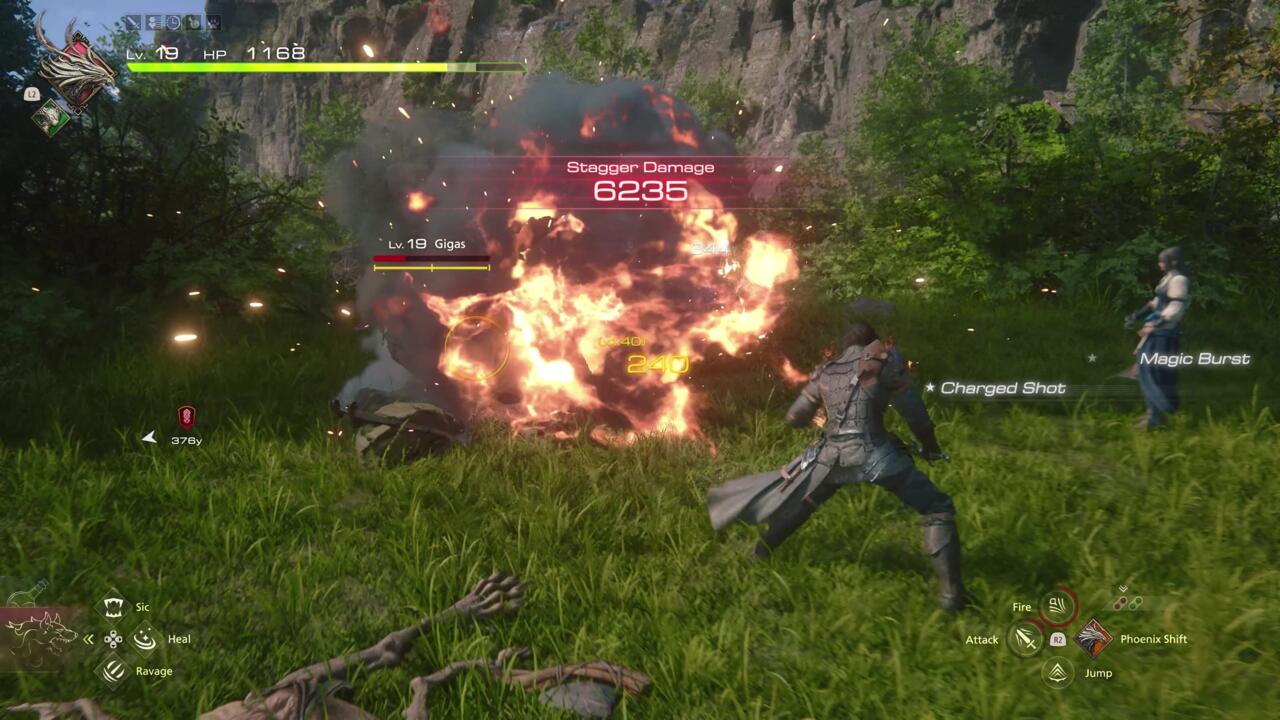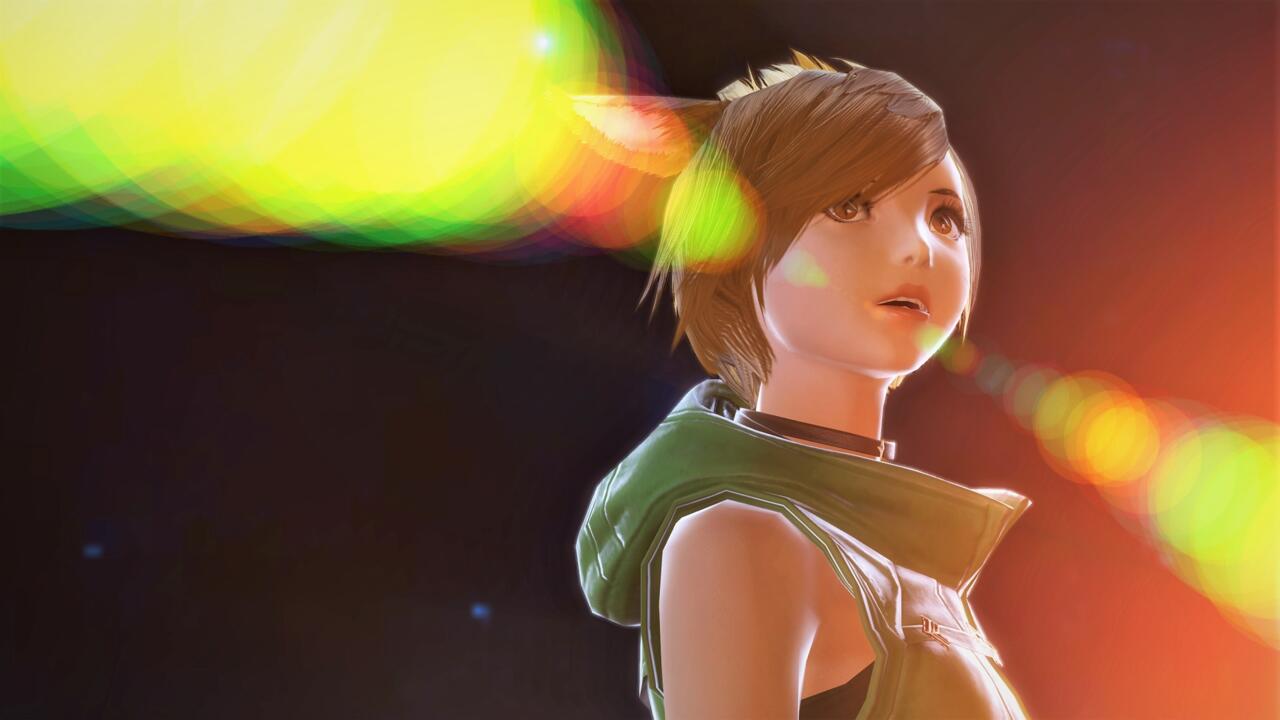Valisthea, the world of Final Fantasy XVI, is a dark place. Not just in the muted color palette of grays and browns that paint the castle keeps and bloodied landscapes, but in the ruthlessness of the story within. A history of betrayal, death, conquest, war, oppression–and whatever else comes to mind when you think of a violent medieval setting–are integral to this new entry in the iconic RPG franchise from Square Enix. While these themes have been present in the series in some form, Final Fantasy XVI’s opening makes it abundantly clear that it’s working in a much more grim context.
I recently got hands-on time with what’s roughly the first four hours of Final Fantasy XVI during a preview event, and saw how the story begins. It’s heavy with cutscenes and cinematic flair, using all the dazzling visuals expected of a PlayStation 5 exclusive, to deliver an opening act akin to a prestige drama.
The demo included sequences of the main protagonist, Clive, in his teenage years to show how tragedy and his royal family’s business fed into a widespread war that carries into his adulthood. It was a vastly different experience to my first preview which was gameplay-focused to showcase the depth and intricacies of the game’s stylish-action combat system. So while I’ll preserve the more revelatory plot points of this new story-heavy preview, there’s still plenty to parse because Final Fantasy XVI is ambitious with its narrative.
A Game About Thrones
Final Fantasy XVI takes itself quite seriously and the type of whimsy you’d typically associate with a Final Fantasy isn’t really found here. Clive is from the Rosfield family, who rule over a kingdom called the Grand Duchy of Rosaria, one of the key nations in Valisthea. His dad seems chill and his mom has an arrogant edge, but both mean business from the get-go. What’s interesting is that Clive is regarded as a talented swordsman who can only partially use Phoenix’s powers, and he’s not the one to fully inherit it, which is traditionally passed down through the family’s generations. Instead, that power went to his younger brother Joshua, who’s a timid and soft-hearted boy caught between his royal duty and just wanting to be a kid.
This is how you come to understand the role of Dominants, the select few who have the ability to summon and transform into Eikons, which are beastly god-like beings capable of mass destruction. It may seem like a blessing, but it is very much a curse, which is apparent in these early hours.

As Rosaria sets on the warpath early on, you see that the two brothers truly care about each other rather than having a strained relationship marred by family drama. There’s a sense of warmth in the few scenes between them sharing their insecurities, portrayed in a genuinely human light. And I think this is one of the critical areas where Final Fantasy XVI could thrive. For all its technical prowess and flashy cinematics, giving characters moments to show their humanity amidst a world seemingly devoid it is one of the things Final Fantasy has historically done best.
On the flipside, my time with Final Fantasy XVI also showed the ugliness of humanity with a sadistic candor. Tragedy and betrayal befalls Clive and his family, and it’s depicted with a level of graphic detail that you wouldn’t expect from the series, even placing you in it with one of the game’s bespoke Eikon-versus-Eikon combat scenarios. But one of the strongest scenes in terms of setting the tone was when you flash forward to Clive’s adulthood; as a bloody battle unfolds in the background, a meeting between leaders of several nations takes place. Tensions run high in this scene as characters assert their authority and show their conniving side behind closed doors, and it’s all brought together by sharp voice acting.
In the war raging on outside–where the Eikons Shiva and Titan are wrecking the entire battlefield–you eventually see that a significant part of Final Fantasy XVI’s story has to do with the enslavement of certain types of magic users. They’re tools for war that are forced into labor and treated as pawns. It’s brutal, and there’s a more complicated dynamic to uncover seeing as how Dominants and some magic users are held in high regard and others are kicked into the dirt to serve a nation. It’s one key area I’m keeping a sharp eye on because if these kinds of themes aren’t treated with the right tone and level of nuance, they can ring hollow or even undermine the broader story.

Clive is caught in the middle of this, having been forced into serving in war because of his combat talents. He’s also marked as the branded one, as seen plainly by the marking on his face, which his fellow soldiers often bring up in gameplay sequences. But Final Fantasy XVI introduces its theme of liberation in these early hours as well. Clive’s new companion Cidolfus, the Dominant of Ramuh, enters the scene to save Clive, and you learn that he’s been staging a rebellion, freeing those who’ve been subjugated by their nations and providing respite for them at his secret hideaway (which also acts as the game’s main hub area).
Despite Clive’s newfound freedom and reuniting with old friends, he’s solely focused on seeking revenge for what happened to his brother Joshua all those years ago. It’s the driving plot thread up to this point and it’s all Clive thinks about, but with all the chaos happening around Valisthea, I hope to see Clive grow into a more dynamic character and be a strong vehicle for connecting us to the complex world that the story tries to set up. Plot twists and narrative threads that pose more questions than answers are packed into its intro, and for now, I’m left intrigued and more eager to see the story all the way through.
Devil May Clive
Not only are long-timers of Final Fantasy in for a new type of story, they’re in for a completely different gameplay experience. While RPG elements are still present, this is by-and-large a fast-paced stylish-action game in the vein of Devil May Cry. Yes, Final Fantasy XV and Final Fantasy VII Remake incorporated action elements, but they’re a far cry from what combat director Ryota Suzuki has cooked up here. His previous work on Devil May Cry 5 shows in Final Fantasy XVI, and you may have gleaned as much from all the gameplay footage and earlier previews.
I gushed about the flow of this new combat system when I first played it in February– although Clive is the only controllable character, you switch between different Eikons on the fly who offer their own unique abilities, as if they’re different loadouts. Having customized my moveset for Ifrit, Garuda, and Titan, I was able to pull off wild combos where I’d air juggle enemies, slam them into the ground for heavy damage, and keep the combo rolling with gap-closing abilities. And the bigger boss battles are challenging in ways that test your ability to dodge AoEs and exploit the stagger system (similar to FFVII Remake).

Even if you’re not attuned to this kind of action game, Final Fantasy XVI features a set of equippable accessories that act as gameplay assists, allowing you to auto-dodge, auto-combo, or slow down for time to help evade attacks for example. Those who are in it for story content can simplify the combat for an easygoing time. It also seems there’s a high skill ceiling from my experience, especially considering there’s a super challenging Ultimania mode with leaderboards you unlock after finishing the story.
However, having played the opening hours, it’s clear that it’ll take some time to get there. It’s important for the game to work players up to the point of feeling like an unstoppable badass, but I found myself mostly mashing the square button to attack, sprinkling in some ranged magic shots, and waiting for my one or two Eikon abilities to refresh from cooldown. I’ve experienced what Final Fantasy XVI plays like at a high level–it’s thrilling and feels like it can stand among the great stylish-action games that came before, but you may be wondering what all the fuss is about when starting the game.
From Fourteen to Sixteen
Part of why I’ve cherished Final Fantasy over the decades is because of its ability to be spirited and poignant in the face of tragedy. Characters wear their hearts on their sleeves and often show emotions to the point of exaggeration, and that type of expression is what I, and many others, have identified with over the years. I also think it’s key to not conflate a darker tone and maturity. While Final Fantasy XVI is « mature » in the M-rated sense, the lessons and themes I’ve come away with from other games in the franchise are as sobering as they’ve always been. Yet I still feel that Final Fantasy can be whatever it wants to be. It’s up to the creators which direction they want to take it, so from that perspective, I’m as fascinated in this new entry as any other that’s come before it–especially since it’s coming from Creative Business Unit III, the folks behind Final Fantasy XIV.
The team’s MMORPG has transcended the genre norms and has become one of the greatest stories told in the franchise. I’ve seen what the developers can do with strong interpersonal stories, lovable characters, captivating political drama, and powerful moments that fuse gameplay, music, and narrative beautifully. When it comes to the balance between inspiring heroics and levity, brutal realities and sometimes the goofiness necessary to find joy in dark times, few games do it as well as FFXIV. Final Fantasy XVI is another beast, for sure, but it’s exciting to see this team try something different and show what they can do outside of the critically acclaimed MMORPG.

As is the case with many RPGs, the most burning questions I have are never going to be answered by any one demo, trailer, or piece of marketing material. As intriguing as the story has been thus far, and as hyped as I am about the stylish-action combat, part of me still holds onto this abstract idea of what Final Fantasy is, and this new mainline entry may be deviating further from it than ever before. But if there’s a team I trust most with taking the series in new directions, it’s the folks who’ve made FFXIV what it is today.
We’ll be able to see for ourselves soon when Final Fantasy XVI launches on June 22, 2023 exclusively for PlayStation 5.
The products discussed here were independently chosen by our editors.
GameSpot may get a share of the revenue if you buy anything featured on our site.










